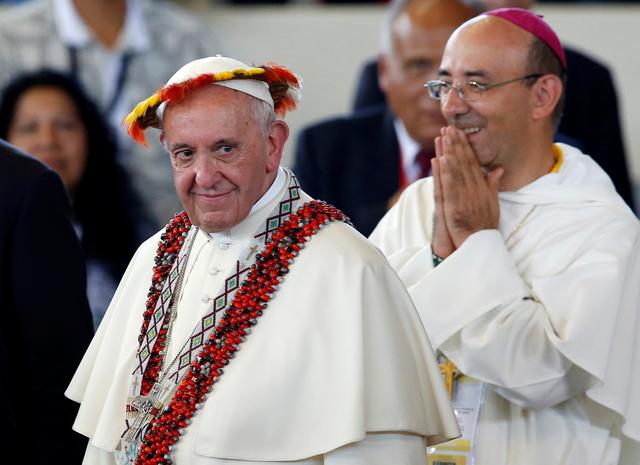Some things change, some things stay the same. I don’t expect this statement to be controversial, but one never knows.
Perhaps acknowledging that anything could be constant is a modern heresy, in a time when even the doctrines of the Roman Church appear to change from week to week, and faithful, “traditional” Catholics who resist are dismissed as a passing faction – here in the provinces, but also at Rome.
They are dismissed, chiefly, by octogenarian “liberals” (the meaning of this word itself has radically changed), who will themselves be passing on, soon. Yet with almost youthful energy, they hurry to alter teachings that go back 2000 years, or much farther.
The latest examples come pre-packaged for the “Amazon Synod.” We are now being told, in breathless documents that seldom mention Christ, that our famed missionary efforts are over. Henceforth we should be taking moral and environmental lessons from the inhabitants of the Amazon jungle.
How are these to be delivered? By blow dart, I assume.
Forgive this characterization: I am one of those traditionalists, and worse, a convert to the “former” Catholic Church; one so reactionary that I actually believe that the teaching of Christ is singular and constant. Only our misunderstandings of it vary over time.
I believe what was true in the first centuries is true today; that the distinctions between true and false must stand even in morality; that what is beautiful stays beautiful, and what is ugly stays ugly, regardless of passing fashions among men.
To my mind, which I’d be willing to disavow if I caught it in error, the human task is not to choose or decide what is right and wrong. Such things were decided in the moment of Creation. Our task is to learn those distinctions, and we should choose or decide in our freedom the path that leads to Heaven over the path that leads to Hell.
This is made more difficult when what we once took for a reliable authority is experiencing a crisis. But the Church is manned by men, and this is hardly the first time in history that she has been captured by them, and turned against herself.
For as the old Church taught, evil comes and goes. It belongs to that order of change, and “progress.” In time, all things will pass – where that plural term is defined as “the things of this world.”
Obviously, a Church that is announcing new teachings to keep up with the times is teaching falsehood. Recently Cardinal Burke and Bishop Schneider – among her old reliables – listed six points of doctrine that were contradicted or even reversed in the blather associated with the Amazon “synod,” and reminded us of our duty to set the record straight.

Yet in a sense there was nothing new about the points in contention. We could guess all six misdirections were coming, if we had paid attention to blather coming through the Vatican itself.
The administrative game that is being played, to introduce married priests, like that to dissolve Church teaching in all areas of sexual morality through (latest gambit) the purge of Saint John Paul II’s Marriage and Family Institute, was hardly the idea of some Amazon tribesman.
These are the long-sought ambitions of “modernists” in the Church – of “trends” visible through many, many decades, unambiguously condemned by popes now out of fashion.
Having four hours to kill recently (in the waiting hall to renew my health card for Ontario’s single-payer medicare system), I carried books to read. One was an anthology of Pope Leo XIII’s encyclicals; the other a pocket edition of Varro’s Rerum Rusticarum, for light relief.
Yes, the rural world of old pagan Rome was full of familiar touches, for anyone who’d lived in a North American small town. It was a happy reminder that even some features of rural life do not change, much.
But not being a farmer today, I found Pope Leo more instructive. The author of Rerum Novarum was faced, well over a century ago, with social developments that were changing the nature of Western Civilization, and had to address them in light of the ancient teachings of the Church he then commanded.
The book fell open within the encyclical, Immortale Dei, published the first of November 1885. I found everything in it relevant to current circumstances.
I began reading almost at random, Pope Leo’s arguments that all religions are not equally true; that the liberty of the press can easily decay into license; that the exclusion of the Church from “civil” philosophy was itself unjust, and led to follies and injustices of many kinds; that sophistry was displacing earnest reason; that the “ideal” of absolutely separating Church from State would lead to the desiccation not of one but of both.
What struck me was the tenor of his arguments. Pope Leo was writing as a teacher, but not of doctrines he was inventing for himself. His use of long-established categories, such as those of monarchy, aristocracy, democracy, and their mixtures, stood out. Sovietism, for instance (then not yet tried), despite democratic pretences, could be classed with absolute monarchy, along with pyramid-building Egypt.
More deeply, running through these encyclicals, was a conception of the necessity of the Church, as a bulwark against “civil” absolutism, which becomes inevitable when Christian principles are vacated.
Today, as the Church is made to bow before strange new gods, such as that of environmentalism, and the attempt is made to rule the masses through fear – of hobgoblins such as “global warming” – we find the opposite approach.
The Church now aspires to be a bulwark of the State; perhaps secretly in the hope that she will be tolerated, and another round of martyrdoms can be avoided. This might be achieved if all her teachings were “updated.”
Some things change, and some things stay the same. Or rather, I should like to update that. Nothing really changes.
*Image: [Reuters/Henry Romero]














